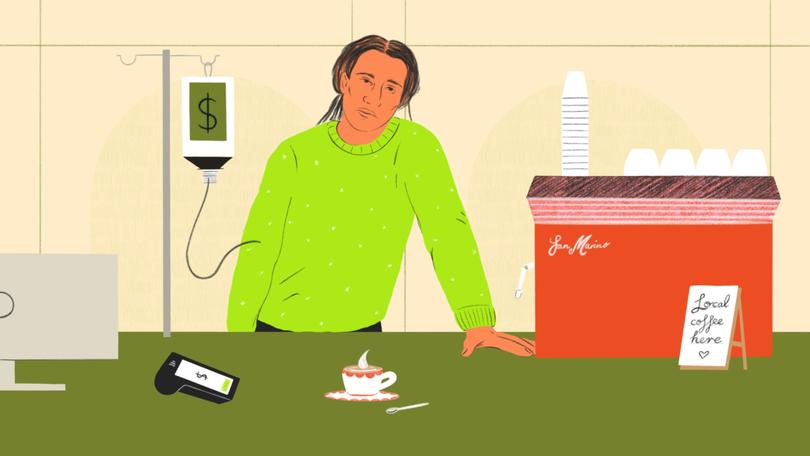GEMMA ACTON: Australia’s small businesses are on life support
GEMMA ACTON: There’s a romanticised glamour about entrepreneurship. The reality, as most small business owners will tell you, is that it’s frequently a slog.

There’s a romanticised glamour about entrepreneurship, whether that’s the idea of creating that perfect product that you’ve always wished existed, riding off into the sunset with Elon Musk-esque riches or just having full autonomy over your life and working on your passion project every day.
The reality, as most small business owners will tell you, is that it’s frequently a slog.
It’s the constant fear that someone else with more credibility and momentum will crop up as a direct competitor, it’s long days and nights doing everything yourself as you can’t afford to hire the necessary staff and it’s the obsessive reviewing of working cash levels to make sure you can survive until the next pick up in sales.
Sign up to The Nightly's newsletters.
Get the first look at the digital newspaper, curated daily stories and breaking headlines delivered to your inbox.
By continuing you agree to our Terms and Privacy Policy.I recently checked to see which politician or leading businessperson in Australia had said “small businesses are the lifeblood of our economy” — and it turns out just about everyone has repeated that well-worn platitude.
Unfortunately, our lifeblood is looking anaemic at the moment with many small businesses suffering immensely.
Last year the economic contribution of small businesses to our economy was pinpointed at an impressive $506 billion — or a third of Australia’s GDP — according to a report from the Australian Small Business and Family Enterprise Ombudsman.
The same report noted that 98 per cent of businesses in Australia are classified as small, with 2.5 million of them responsible for hiring more than five million workers.
Within that context, the latest figures make for sobering reading. Equifax’s analysis of the first quarter of 2024 reveals the highest number of business insolvencies on record, a 41.1 per cent increase from a year earlier.
In the words of Equifax’s Scott Mason: “The insolvency tsunami has hit Australian businesses across the board and, unfortunately, we are still approaching its vortex.”
Unsurprisingly, it’s the construction, hospitality and retail industries feeling the most severe heat.
Equifax data show small businesses in the construction industry are paying their dues later than their peers in other industries — on average 10.2 days past the agreed terms.
CreditorWatch’s March 2024 Business Risk Index flags 8.6 per cent and 8.1 per cent of invoices issued by food and beverage and retail businesses, respectively, are now more than 60 days past their due dates.
CreditorWatch also points to food and beverage businesses as facing the highest risk of collapse with that risk of failure quantified at 7.44 per cent.

No doubt many of us can visualise shopping strips within our orbit where ever more “for lease” signs are springing up or there’s a constant rotation of cafe and clothing shopfronts as none are able to last the distance.
Faced with high energy bills, crippling rents, soaring inflation premiums, prohibitive labour costs and elevated grocery prices, the creative options open to restaurants and cafes are shrinking with customers increasingly sensitive to spending, two-and-a-half years into the cost-of-living crisis.
Redesigning menus and substituting ingredients — euphemistically known as “cost engineering” — with frenetic frequency has become a repetitive and relentless task, some long-time kitchen insiders tell me.
Television star chef Kylie Kwong announced on Monday that she is stepping away from hospitality outright, saying: “Everyone is feeling it. I have never seen the restaurant industry in such tough times as it is right now.”
Often, it’s the smaller businesses who provide the “nice to haves” in our lives which we are forced to bin when times get tight. They often also supply the more craft or premium option, often at a premium price, which can make customers more inclined to pull back on purchasing when trying to rein in household expenses.
Sadly, these items are often the things that bring a little colour to our lives and are more reflective of our personalities than the cheaper, mass-market goods we end up steering towards to save money.
The compounded disappointment in this is that a small business feels a customer’s loss much more keenly than the large businesses that end up winning in inflationary environments like these.
I’m probably not the only one suffering whiplash from the “will they, won’t they” regarding the Reserve Bank’s rate setting plans.
Just two weeks ago, we were all bracing again for a likely hike within months. Now, a weak retail sales report and labour market update later, we’re all shuffling back into position for a rate cut potentially before Christmas.
Add to that the weakest consumer confidence read so far in 2024 last week and it’s looking increasingly likely.
With the latest jobs report highlighting the ongoing theme of “labour hoarding” — or businesses hanging onto workers despite having more of them than they need to avoid having to fire and re-hire if activity picks up — the signal is clearly one of caution and indeed uncertainty over where to from here.
Last week’s Federal Budget — delivered an expected one year out from the next Federal election — sought to please all voters a little bit. So there were a few scraps in there for small businesses (including the extension of the Instant Asset Write-off Scheme and $325 towards energy bills) but ultimately what will matter most is the footing on which the Budget puts our overall economy.
We need Australian consumers — small business customers — to regain the confidence and wherewithal to be able to support our lifeblood. Just how effective the new policy decisions have been will become clear later on this year.

